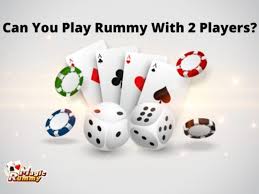Rummy Two Players, is a popular card game known for its blend of skill, strategy, and a bit of luck. While typically enjoyed with three or more players, two-player Rummy is a unique variant that brings its own set of challenges and dynamics. This head-to-head format emphasizes strategic planning, careful observation, and quick adaptation, making it an engaging and competitive experience. In this article, we’ll explore the rules, strategies, and tips for mastering two-player Rummy.
Basic Rules of Two-Player Rummy
- Objective: The primary goal in two-player Rummy, as in other variations, is to form sets or runs with your cards and be the first to “go out” or reach a predetermined number of points. A set consists of three or four cards of the same rank but different suits, while a run is a sequence of three or more consecutive cards of the same suit.
- Setup:
- Deck: The game uses a standard 52-card deck, with or without jokers depending on the chosen variation.
- Dealing: Each player is dealt 10 cards (some versions may deal 7 or 13 cards). The remaining cards form the draw pile, with the top card placed face-up to start the discard pile.
- Gameplay:
- Turns: Players take turns drawing a card from either the draw pile or the discard pile and then discarding one card.
- Melding: On their turn, a player can place sets or runs on the table. Players can also add cards to existing melds, either their own or their opponent’s.
- Going Out: The game continues until one player discards their last card, thus “going out.” The player must have melded all their cards or be able to discard their last card.
- Scoring:
- Points are calculated based on the cards remaining in the opponent’s hand, with face cards worth 10 points, aces worth 1 point, and numbered cards worth their face value. The player who goes out first usually scores zero points, while the opponent’s unmelded cards are summed up as their penalty points.
- The game can be played in a single round or multiple rounds until a player reaches a predetermined score, such as 100 or 500 points.
Strategies for Two-Player Rummy
- Observation and Memory:
- Pay close attention to the cards your opponent picks up and discards. This can give you clues about the sets or runs they are trying to form and help you make decisions about which cards to keep or discard.
- Try to remember the cards that have been discarded, as this will help you understand which cards are likely unavailable.
- Discard Strategy:
- Discard cards that are unlikely to help your opponent. For example, avoid discarding cards that could complete a run or set for them.
- If possible, discard high-value cards early to minimize potential penalties if your opponent goes out first.
- Melding and Holding:
- Decide strategically when to lay down your melds. Sometimes, it’s advantageous to wait and keep your cards hidden, especially if you suspect your opponent is close to going out.
- Holding onto certain cards, such as those that could complete multiple sets or runs, can provide flexibility and strategic advantage.
- Jokers and Wildcards:
- If playing with jokers or wildcards, use them judiciously. They can be powerful tools to complete or extend melds.
- Be cautious about using jokers early, as they can be crucial in forming essential sets or runs later in the game.
Tips for Beginners
- Start Simple: If you’re new to two-player Rummy, focus first on forming basic sets and runs. As you become more comfortable with the game, you can start to employ more advanced strategies like baiting your opponent into discarding useful cards.
- Stay Flexible: Be ready to adapt your strategy based on the cards you draw and the cards your opponent discards. Flexibility is key to navigating the changing dynamics of the game.
- Practice: Like any card game, the best way to improve at two-player Rummy is through practice. The more you play, the better you’ll become at spotting potential melds and predicting your opponent’s moves.
Conclusion
Two-player Rummy offers a fascinating and intense gaming experience that sharpens your strategic thinking and observational skills. Whether you’re playing casually with a friend or competing in a more serious setting, mastering the intricacies of two-player Rummy can be both challenging and rewarding. With a good mix of strategy, memory, and adaptability, you can enhance your gameplay and enjoy the nuances of this classic card game.




